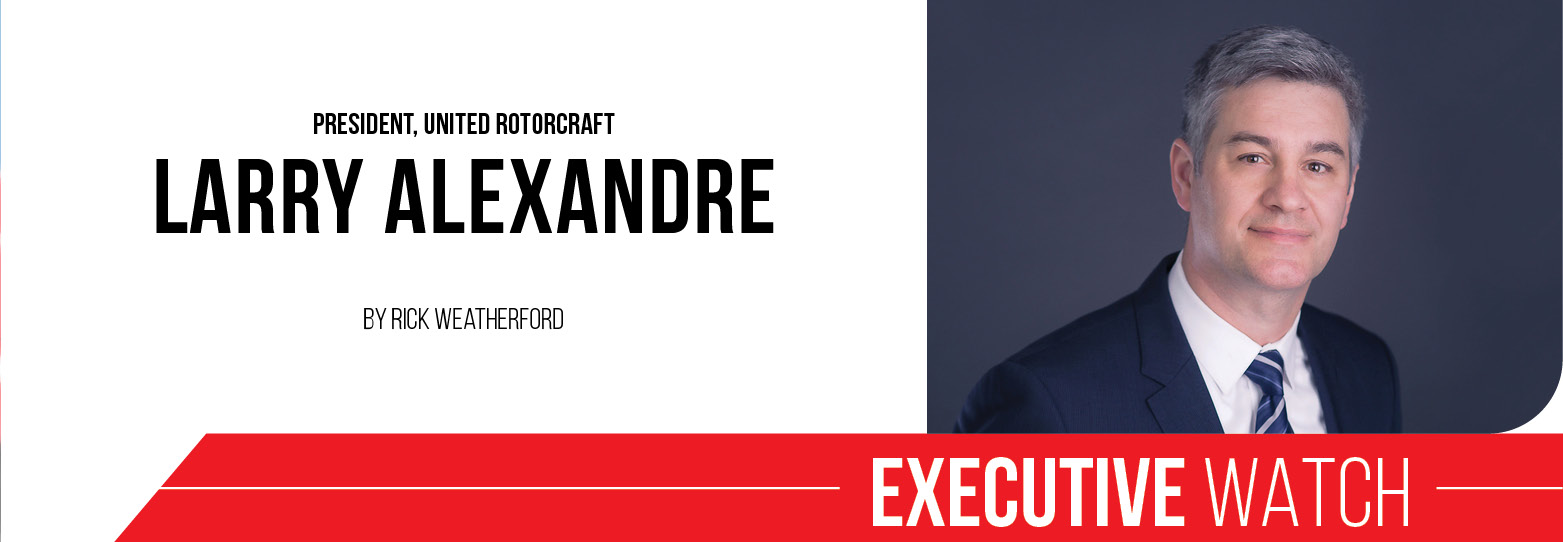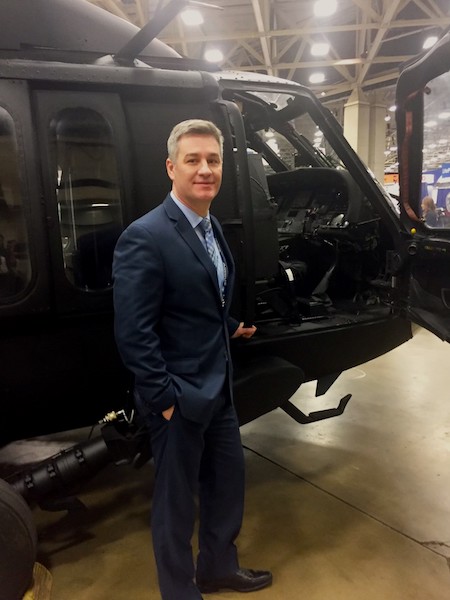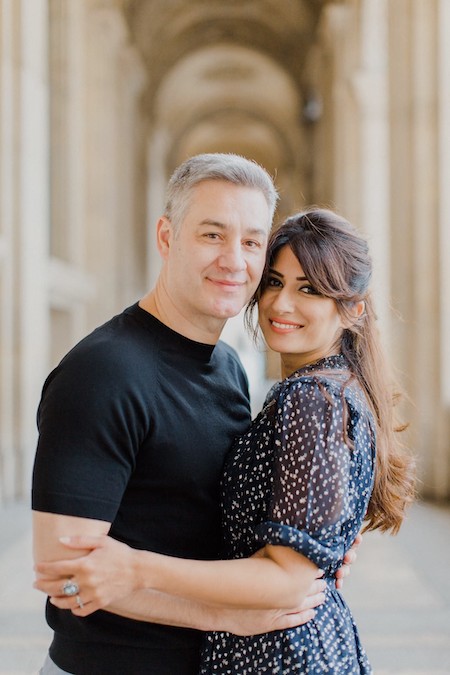|
Mar
28
2022
|
|
Posted 3 years 324 days ago ago by Admin
|
|

The first impression is that Larry Alexandre seems not properly placed to lead United Rotorcraft, a well-known maintenance, repair and overhaul (MRO) leader that specializes in customizing helicopter medevac interiors one aircraft at a time. Alexandre is passionate about Lean, the practice of creating a more effective business by eliminating wasteful practices and focusing on value creation for customers. “Very few MROs in our industry believe that Lean principles apply in our world, often because they believe it is only for high volume manufacturing. I’m a big believer in and practitioner of Lean principles to rally an entire team around making your business better (through efficiency) and creating value for your customers.” Earlier in his career when he worked in Operations at Turbomeca, Alexandre says, “I enjoyed taking inefficient practices, often rampant in fragmented industries like the helicopter industry, and making them more efficient and process-oriented. I started each day with the belief that anyone in the team, with the right focus, could find waste in their processes, eliminate it, and improve efficiency.”
With quotes like that, one could envision Alexandre swinging a meat cleaver to cut off fat with little concern for employees and craftsmanship. Isn’t United Rotorcraft known for lovingly customizing one helicopter at a time? How can we let Henry Ford come in and replace custom craftsmanship with his industrial assembly lines?
Before we send Cousin Eddie out next Christmas Vacation to kidnap Alexandre, tie him in a big red bow, and make him see how his cost cutting, jelly-of-the-month-club ideas hurt “little people” like the Griswold family, let’s remember one bottom-line fact: real business executives are more human—and humane—than fictional businessman tropes. First impressions can be dead wrong. We never saw Michael Douglas as Wall Street’s Gordon Gecko reading Think Like a Monk, but Alexandre is currently consuming that self-help book about leading a balanced life. (His wife, Prab, is a life coach.) “In my 30s, it was work, work, work all the time climbing the ladder and trying to prove myself. Maybe I’m just aging, but I make it clear to my team throughout the year that I’m not impressed with someone working 60 or 70 hours a week,” Alexandre says. “I’m impressed by those who get their job done in 40 hours and have a life away from work. I have the responsibility as the leader of a business, as do the leaders around me, to make sure that we give our employees that ability to have balance. It’s so important because eventually burnout happens, people disengage or eventually walk away in a market where it’s difficult to find talent. Our objective as leaders should be to help our teammates work smarter, not ask them to work harder to compensate for inefficient processes. That is the essence of Lean.”
So much for first impressions. Put that in your smipe and poke it, Gordon Gecko! That’s how real business leaders talk.

Let’s let Alexandre dispel another misimpression: United Rotorcraft does much more than customize medevac interiors. He says, “Yes, we are known for customizing medical interiors, but we also support law enforcement and firefighting, as well as manufacture a lot of military equipment, most of which is repeat work. We focus on mission critical equipment: we can design, manufacture, certify, and install that equipment.” He further surprises with this fact: “Everyone wants some level of customization for their interior, avionics, and communication equipment, but 80% of our baseline work is common among type customers.” So, it makes perfect sense to streamline, or standardize those common processes to make United Rotorcraft’s services more affordable and reliable for more customers. Alexandre says that most people don’t realize that approx. 30% of United Rotorcraft’s business comes from manufacturing and assembling the same thing over and over again; that “thing” is medevac interiors for the Black Hawk for the US Army. United Rotorcraft’s large military business is primarily production runs that scream for a balanced, operations guy like Alexandre.
How a French citizen like Alexandre landed at his current American helicopter pad is an unconventional story that has no room for misimpressions. The best way to begin his story is to suggest you put away your French-English dictionary, for Alexandre has no hint of his native nation’s accent and his English vocabulary is precise and broad. He speaks as if he didn’t spend his young garçon days playing football (soccer) in Parisian parks, which he did, but instead speaks like he grew up playing basketball on upstate New York courts—which he did. Hang your preconceptions at the door, come in from the cold and pull a chair by the fire, sip on a fine French wine (Alexandre’s favored pastime), and hear his tale…
From Paris to New York
Alexandre was born and grew up in Paris for his first decade of what has been an adventurous life of learning and travel. The Parisian boy’s father had a steady job working at Safran Engines (back then the company was Snecma). Suddenly, Alexandre found himself moving with his sibling and homemaker mom to America as his father transferred to Clinton, New York, to work on supply chain issues. “I was in the sixth grade and didn’t know a lick of English. I moved from a city of millions of people to a small town of 10,000. This profoundly changed the course of my life—for the better,” he says. “It not only allowed me the opportunity to immerse myself in a second language (he now also speaks Italian and Spanish) but also exposed me to a different culture. Becoming bilingual and bicultural has been a great asset for me.”
One American offering Alexandre jumped into was basketball. “That became my sport,” he says. In fact, it became more than that; it eventually became his part-time job. At age 17, after returning to France, and for a period of 5 years, Alexandre actually played semi-professional hoops for a club outside of Paris. Lest our imagination soar like Michael Jordan, Alexandre sets a screen to keep us in check: “Keep in mind that this was the late 1980s and basketball was just a developing sport in France; I wasn’t (French-American NBA player) Tony Parker!” But basketball and school were pretty much Alexandre’s young life and he continued the sport into adulthood. Unfortunately, a tendon tear a couple of years ago stifled Alexandre’s court prowess. “I’m still in denial that my basketball days are behind me,” he softly concedes.
Education and Service
While in France, Alexandre earned the equivalent of a U.S. bachelor’s degree at the international business school, ESSEC. (A decade later, Alexandre earned a master’s degree in business from The Ohio State University.) Upon graduating from ESSEC, he did a stint with an artificial intelligence (AI) company until he began his compulsory year of military service for France. He spent 1991 in the French air force. “After the initial couple of months of training, it became mundane as I got parked at a base, but it’s not a bad idea to engage citizens in their country’s defense,” he says, noting that military service is no longer mandatory in France. That “parked” year was not idle. He says, “So many in the aviation industry are military trained; being familiar with military culture is an asset.”

Career Launch
After the air force, Alexandre began his civilian aviation career in earnest. In hindsight, it seemed an inevitable industry for him to enter. “Not only was my father in aviation, but I also had other relatives in the industry and that’s probably why I ended up in aviation and still live in the United States (working in the industry),” he says. Starting out, Alexandre began in sales at a company in England; Sermatech Teleflex that supplied aviation turbine engine manufacturers like Snecma, GE, Rolls Royce, etc. He initially moved to Lancashire in 1993 and remained with the company for 11 years, crossing back-and-forth between England and France throughout his employment before eventually being sent to Teleflex’s headquarters in the U.S.
In his first job, Alexandre hit the jackpot by finding not only a boss, but a mentor for life and work: Skip Kundahl. “He was just an amazing guy. What I saw in him was a leader who made leadership look effortless just by being truly empathetic. He was very caring; he was employee- and team-centric. He didn’t make short-sighted decisions, but considered how a decision would affect employees and the company in the long-term.” Alexandre concludes, “He not only showed me how to be a good leader, but also how important it was to be a nice guy. Too often, being a nice guy is seen as a weakness, but here was a guy who had the best results and was loved by his customers and employees.”
With that first role model giving him a good start, by 2001 Alexandre had risen to VP of sales and approached his U.S. boss about expanding his responsibilities into Operations. He remained VP of Sales, but was also assigned to running international operations outside the U.S. Alexandre was extensively traveling internationally for sales, so this was a natural expansion of responsibilities, as well as an efficient use of the company travel budget. “I used the same plane ticket to go see sales customers and to run international operations,” Alexandre remarks. There again, Alexandre was able to find a number of role models around him:“ Many of my peers came from GE and brought a wealth of operations management experience with them,” he says. “I sucked all the knowledge I could from them and copied and pasted, in a lot of ways, what they did and made it my own.”
Four Types
One insight Alexandre took from these executives was how to assess employees. (Read and learn!) “I was told there were four types of employees: (1) The guys that have great skills, great performance, and great attitude; these are the ones you reward and groom by giving them more responsibility. They’re an easy decision. (2) The ones that have poor skills, poor performance, and crappy attitude. They need to go; that’s another easy decision. (3) The ones that fall short on the performance side, but have a great attitude. These are the ones that you want to invest in, coach and help them overcome their gaps. (4) The ones that perform, but have a (crappy) attitude and feel rules don’t apply to them. These are the worst type. Because they perform or have a specific or unique skill, they exert a lot of influence in the organization. Their negative attitude however makes them a negative influence on the business. They can become a growing cancer for the business, and as hard as it may be for a short period of time, these must go. I’ve kept these categories in mind since I learned them 20 years ago and tried to apply them. It’s very hard to tell a star performer with a bad attitude they have to change or have to go. I failed to make that call a few times in my career, and realized too late that I wasn’t following through with what I was preaching.”
When he joined Turbomeca (now known as Safran Helicopter Engines) in 2005, Alexandre discovered the uniqueness of the helicopter industry. “It was very interesting, but very different; I went from having a few very large customers like GE, Rolls Royce, and Pratt & Whitney, to having 600 smaller helicopter customers in the U.S. alone. The majority of our rotorcraft industry is guys having two to four helicopters who require, demand, and deserve the same level of service as the biggest operators.”
Other Positions
Alexandre spent over five years at Turbomeca, which gave him entrée to the rotorcraft world. After leaving Turbomeca, he spent shorter tenures as CEO and/or president at Sagem Avionics and Heli-One, and was managing partner of Vancouver-based consulting firm, Alexandre Dhanwant Associates for over six years. He also serves on boards for Optima Aero and Erickson Inc.
United Rotorcraft
In 2020 Alexandre became the current president of United Rotorcraft and has been bringing those efficient, best practices mentioned earlier to the MRO and completions sector. United Rotorcraft is going to especially need them if Alexandre’s vision for the future is realized. Remember that his first post-college job was for an artificial intelligence (AI) company. AI is basically the ability of machines and software to learn and adapt autonomously. Alexandre foresees AI affecting future critical flight missions, but not just flight missions. “Amazing technology is coming that could improve an MRO shop,” he says. “There are already virtual or assisted wearable technology applications that provide instructions and decision-making aids on a shop technician’s goggles or headset. That same technology could one day be applied in the back of an aircraft, as an example, to aid in providing critical care to a patient in flight.”
According to Alexandre, the technology will change, but United Rotorcraft will remain focused on what really counts. “Our employees are truly focused on the guys and gals that fly and save lives, such as clinicians, medevac pilots and personnel, and firefighters. We take great pride in supporting those frontline heroes and like to think we contribute to their heroic work, even though we may be one or two steps removed from the frontline.”
United Rotorcraft and its president may be slightly removed from the front line, but they remain on the cutting edge.
READ MORE ROTORCRAFT PRO JAN/FEB ISSUE